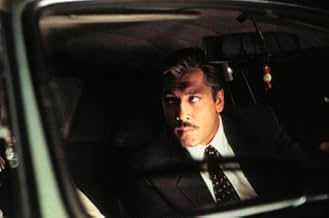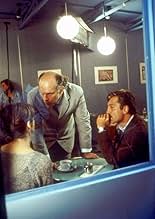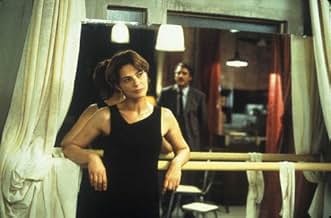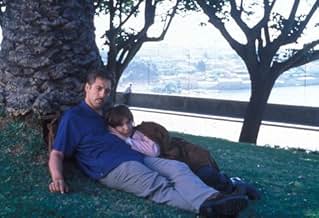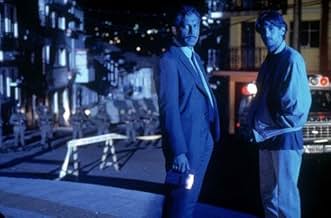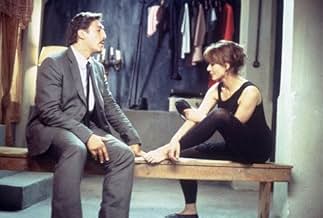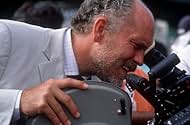ÉVALUATION IMDb
6,8/10
7,1 k
MA NOTE
Un détective de police dans un pays d'Amérique du Sud se consacre à la traque d'un chef de guérilla révolutionnaire.Un détective de police dans un pays d'Amérique du Sud se consacre à la traque d'un chef de guérilla révolutionnaire.Un détective de police dans un pays d'Amérique du Sud se consacre à la traque d'un chef de guérilla révolutionnaire.
- Prix
- 1 victoire et 3 nominations au total
Avis en vedette
Actor John Malkovich makes an auspicious directorial debut with `The Dancer Upstairs,' an intriguing, if not altogether satisfying, police procedural set in an unnamed Latin American country.
Javier Bardem (`Night Must Fall') gives a richly textured performance as Detective Augustin Rejas, a man of principle and ethics operating in a world of corruption and violence. Rejas finds himself embroiled in a life-and-death mystery when he investigates an underground terrorist organization that is targeting key government officials for assassination. Who these people are is not at all clear to those in charge and even their motives can only be guessed at. As Rejas studies the clues in search of answers, he becomes drawn to a beautiful young dance teacher with whom he establishes a platonic yet highly charged romantic relationship. It is in the bringing together of these two seemingly disparate plot lines that the movie fails, ultimately, to satisfy. For roughly the first three quarters of the film, as Rejas collects his evidence and unravels the puzzle, we gladly go along where the filmmakers are taking us, fascinated by the setting, the atmosphere and the contemporary relevance of the terrorism theme. But when, towards the end, the story kicks into high tragedy mode, the movie loses us, partly because the plotting itself is not particularly credible and partly because the relationship between Rejas and the woman has not been sufficiently developed to achieve the status of genuine tragedy. The film is much better when it sticks to the business of the case and leaves all the existential navel-gazing out of the mix.
This is not to demean either the moving, beautifully modulated performance of Bardem or the stark, self-assured direction of Malkovich, who shows he knows how to function as well behind the camera as he does in front. True, the film is a trifle slow at times but this just shows that Malkovich will not be rushed when the material itself demands deliberation and care. Although the movie is about a half hour too long, real languor begins to set in only during the final stretches. Until then, `The Dancer Upstairs' makes for rewarding viewing.
Javier Bardem (`Night Must Fall') gives a richly textured performance as Detective Augustin Rejas, a man of principle and ethics operating in a world of corruption and violence. Rejas finds himself embroiled in a life-and-death mystery when he investigates an underground terrorist organization that is targeting key government officials for assassination. Who these people are is not at all clear to those in charge and even their motives can only be guessed at. As Rejas studies the clues in search of answers, he becomes drawn to a beautiful young dance teacher with whom he establishes a platonic yet highly charged romantic relationship. It is in the bringing together of these two seemingly disparate plot lines that the movie fails, ultimately, to satisfy. For roughly the first three quarters of the film, as Rejas collects his evidence and unravels the puzzle, we gladly go along where the filmmakers are taking us, fascinated by the setting, the atmosphere and the contemporary relevance of the terrorism theme. But when, towards the end, the story kicks into high tragedy mode, the movie loses us, partly because the plotting itself is not particularly credible and partly because the relationship between Rejas and the woman has not been sufficiently developed to achieve the status of genuine tragedy. The film is much better when it sticks to the business of the case and leaves all the existential navel-gazing out of the mix.
This is not to demean either the moving, beautifully modulated performance of Bardem or the stark, self-assured direction of Malkovich, who shows he knows how to function as well behind the camera as he does in front. True, the film is a trifle slow at times but this just shows that Malkovich will not be rushed when the material itself demands deliberation and care. Although the movie is about a half hour too long, real languor begins to set in only during the final stretches. Until then, `The Dancer Upstairs' makes for rewarding viewing.
Very closely based on Guzman and the Shining Path Maoist terrorists in Peru, this movie is compulsive viewing.
The plot is fairly standard good cop tracks down bad guys - there are no bonus points for this plot. Indeed, some of the coincidences that arise as the film goes on are the weakest link in this otherwise near-flawless movie.
There has been much talk about the violent scenes in this movie, which are many, but especially the scenes with animals. My view is that it is no more morally wrong to depict violence to animals than it is to depict violence to humans, as long as no animal (or human) is actually harmed in making the depiction. We are told that none of the animals were harmed in the making of the film (and presumably also none of the people). As far as I am concerned that is the end of that matter - the use of animals, unhamred, for this purpose is acceptable. To argue otherwise I find, frankly, daft. However, I would recommend that people who get particularly upset when violence to animals is depicted should simply avoid this movie.
Back to the movie - the acting and the cinematography are superb. It is gripping - the film is 135 minutes long which is well past my attention span unless the film is really good. This film is just that.
The plot is fairly standard good cop tracks down bad guys - there are no bonus points for this plot. Indeed, some of the coincidences that arise as the film goes on are the weakest link in this otherwise near-flawless movie.
There has been much talk about the violent scenes in this movie, which are many, but especially the scenes with animals. My view is that it is no more morally wrong to depict violence to animals than it is to depict violence to humans, as long as no animal (or human) is actually harmed in making the depiction. We are told that none of the animals were harmed in the making of the film (and presumably also none of the people). As far as I am concerned that is the end of that matter - the use of animals, unhamred, for this purpose is acceptable. To argue otherwise I find, frankly, daft. However, I would recommend that people who get particularly upset when violence to animals is depicted should simply avoid this movie.
Back to the movie - the acting and the cinematography are superb. It is gripping - the film is 135 minutes long which is well past my attention span unless the film is really good. This film is just that.
Acclaimed actor John Malkovich has made his directorial debut with an assured political thriller that combines tension and intelligence to make for a gripping two and a quarter hours. The setting is a South American country which is unnamed, but the clear inspiration for the storyline is the early 1990s experience of Peru (which I have recently visited) when the bizarre Abimael Guzman led the murderous Shining Path movement, while the movie was shot in Spain, Portugal and Ecuador.
Javier Bardem plays Augustin Rejas, a former lawyer turned policeman who manages rare dignity and honesty as he battles with the interventions of a regime teetering on the edge of a military dictatorship and the pursuit of a fanatical revolutionary codenamed Ezekiel, while struggling with the varying emotions associated with a vapid wife, an adoring daughter, and his daughter's dance teacher, the eponymous and allurring woman upstairs (Laura Morante as Yolanda). Bardem - who reminds me of an early Raul Julia - gives a languid yet charismatic performance and hopefully we will see much more of this talented actor.
In some respects the work is reminiscent of Costa-Gavras's "State Of Siege", a clip of which is actually used here. However, the movie is based on a novel by the British writer Nicholas Shakespeare, who wrote the screenplay which features some conversation in Quechua (a native language of Peru and Bolivia), and this is a more personal examination of terrorism than the 1973 movie.
Javier Bardem plays Augustin Rejas, a former lawyer turned policeman who manages rare dignity and honesty as he battles with the interventions of a regime teetering on the edge of a military dictatorship and the pursuit of a fanatical revolutionary codenamed Ezekiel, while struggling with the varying emotions associated with a vapid wife, an adoring daughter, and his daughter's dance teacher, the eponymous and allurring woman upstairs (Laura Morante as Yolanda). Bardem - who reminds me of an early Raul Julia - gives a languid yet charismatic performance and hopefully we will see much more of this talented actor.
In some respects the work is reminiscent of Costa-Gavras's "State Of Siege", a clip of which is actually used here. However, the movie is based on a novel by the British writer Nicholas Shakespeare, who wrote the screenplay which features some conversation in Quechua (a native language of Peru and Bolivia), and this is a more personal examination of terrorism than the 1973 movie.
I suppose this could be described as an off-Hollywood detective story with political overtones. It is based on a book by Nicholas Shakespeare (a part-time Australian) who has in turn loosely based his story on the rise and fall of the `Shining Path' or Sendero Luminoso insurgency in Peru (1980-1995). As rendered on film (Shakespeare also wrote the screenplay), we have an immensely likable policemen, Rejas, played to perfection by Javier Bardem, literally searching through the rubbish to find the shadowy Ezequiel, leader of a movement with a fine record of atrocities, but no program or real philosophy.
Nicholas, alas, is no Shakespeare, and the film becomes very slow in parts, though there are plenty of dramatic moments and some crisp editing. Bardem gets good support from some of the other actors such as Juan Diego Botto who plays his sidekick Sucre and Laura Morante as Yolanda the enigmatic ballet teacher he becomes involved with. Most of the cast are Spanish but the prodution was filmed in English, which has created an intermittent audibility problem. The film is also beautifully shot, the locations in Ecuador and Oporto, Portugal, being used to great advantage.
While the film succeeds quite well as a detective story it telegraphs too many punches to work as a thriller. However it's the politics that really let it down. Clearly, we have a not very nice, if elected, government under attack, and it's almost inevitable that the even more not very nice Army is going to step in. Against who? People who load up dogs with dynamite and send them in to crowded marketplaces. People who send in 10 year olds into village cafes to blow up themselves along with some local notables. The explanation for this comes only in one-liners such as `I am already dead, I live only for the revolution.' When Ezequiel, the former philosophy lecturer is finally captured, all he can say is `You cannot capture this ` (tapping his forehead). `We are already part of history.' Surely there is a better explanation for `Shining Path' than this. My own theory is that it is a rather nasty combination of French post-modern philosophy (Derrida, Foucault etc) mixed up with Marxism and Maoism and served up to people with not much to lose. If you are already dead you might as well die for the revolution. It's either that or slave for the whites.
Actually, `Shining Path' had some competition in the shape of Tupac Amaru, who captured the Japanese Embassy in Lima and held 70 or so people hostage for over 4 months in 1996-97, until being overwhelmed by Peruvian commandos who tunnelled in beneath them. None of the guerrillas survived. By the time I visited Lima and the Cuzco area in late 2000 all was quiet on the revolutionary front, though President Fujimori, hero of the embassy siege, despite having won a recent election was on his way out. I haven't read it yet, but I'm told Gustavo Gorriti's `The Shining Path: A History of the Millenarian War in Peru' is a good history of the era.
Maybe it's asking too much for political explanations, though the director clearly wants the film to be compared with Costa-Gravas' excellent `State of Siege' (which is shown briefly at one point and provides a vital clue as to Ezequiel's location). As to the direction, Malkovich seems a little uncertain whether he is making a thriller or something more reflective but he has a good sense of dramatic timing and a good visual sense. Perhaps more attention to the editing would have sharpened up the mood.
Nicholas, alas, is no Shakespeare, and the film becomes very slow in parts, though there are plenty of dramatic moments and some crisp editing. Bardem gets good support from some of the other actors such as Juan Diego Botto who plays his sidekick Sucre and Laura Morante as Yolanda the enigmatic ballet teacher he becomes involved with. Most of the cast are Spanish but the prodution was filmed in English, which has created an intermittent audibility problem. The film is also beautifully shot, the locations in Ecuador and Oporto, Portugal, being used to great advantage.
While the film succeeds quite well as a detective story it telegraphs too many punches to work as a thriller. However it's the politics that really let it down. Clearly, we have a not very nice, if elected, government under attack, and it's almost inevitable that the even more not very nice Army is going to step in. Against who? People who load up dogs with dynamite and send them in to crowded marketplaces. People who send in 10 year olds into village cafes to blow up themselves along with some local notables. The explanation for this comes only in one-liners such as `I am already dead, I live only for the revolution.' When Ezequiel, the former philosophy lecturer is finally captured, all he can say is `You cannot capture this ` (tapping his forehead). `We are already part of history.' Surely there is a better explanation for `Shining Path' than this. My own theory is that it is a rather nasty combination of French post-modern philosophy (Derrida, Foucault etc) mixed up with Marxism and Maoism and served up to people with not much to lose. If you are already dead you might as well die for the revolution. It's either that or slave for the whites.
Actually, `Shining Path' had some competition in the shape of Tupac Amaru, who captured the Japanese Embassy in Lima and held 70 or so people hostage for over 4 months in 1996-97, until being overwhelmed by Peruvian commandos who tunnelled in beneath them. None of the guerrillas survived. By the time I visited Lima and the Cuzco area in late 2000 all was quiet on the revolutionary front, though President Fujimori, hero of the embassy siege, despite having won a recent election was on his way out. I haven't read it yet, but I'm told Gustavo Gorriti's `The Shining Path: A History of the Millenarian War in Peru' is a good history of the era.
Maybe it's asking too much for political explanations, though the director clearly wants the film to be compared with Costa-Gravas' excellent `State of Siege' (which is shown briefly at one point and provides a vital clue as to Ezequiel's location). As to the direction, Malkovich seems a little uncertain whether he is making a thriller or something more reflective but he has a good sense of dramatic timing and a good visual sense. Perhaps more attention to the editing would have sharpened up the mood.
It's Latin America in the Recent Past. Agustín Rejas (Javier Bardem) is a Sergeant manning a road check. The country is corrupt with a militaristic Presidency. Rejas is a former lawyer ready for a promotion in the capital. A mysterious man with others and a dead dog in a truck escape the checkpoint. Then it's five years later. He's a police Lieutenant. With his young partner Sucre (Juan Diego Botto), he's investigating a mysterious revolutionary group led by Ezequiel. They hang dogs from the lamp posts. The violence escalates as leaders get assassinated. Yolanda (Laura Morante) is Rejas' daughter Laura's dance teacher. He begins an affair with her as he suspects her connection to Ezequiel.
The non-specificity of the time and place could have been improved by weaving the real story into this movie. It doesn't have to be perfect and most movies aren't real biographies anyways. The great aspect of this is Bardem and the sense of Latin America that this projects. John Malkovich is directing for the first time and he shows some competency. It is well-made and most importantly, he focuses on Bardem. The story does leave some questions. The ballet teacher's connections to everyone is very convenient. The investigation is not that clear. I don't know how nebulous the book is but adapting may have left something out of the movie. It would help to have great clarity, and better intensity.
The non-specificity of the time and place could have been improved by weaving the real story into this movie. It doesn't have to be perfect and most movies aren't real biographies anyways. The great aspect of this is Bardem and the sense of Latin America that this projects. John Malkovich is directing for the first time and he shows some competency. It is well-made and most importantly, he focuses on Bardem. The story does leave some questions. The ballet teacher's connections to everyone is very convenient. The investigation is not that clear. I don't know how nebulous the book is but adapting may have left something out of the movie. It would help to have great clarity, and better intensity.
Le saviez-vous
- AnecdotesThe story is inspired by the Maoist insurgency in Peru known as the Shining Path. Its leader Abimael Guzmán, who was known by the nom de guerre President Gonzalo, was captured in an apartment above a ballet studio in the capital city of Lima in 1992. The ballet teacher Yolanda was based on Maritza Garrido Lecca, the woman in whose apartment Guzmán was found. Bardem's character was inspired by Benedicto Jimenez and Gen. Antonio Ketin Vidal, the leading figures responsible for Guzmán's capture.
- GaffesWhen Sucre & Llosa arrest the young woman in orange, she has been handcuffed to the ceiling of the car. But then en route, soldiers simply drag her out of the backseat. No handcuff keys. No bolt cutters.
- Citations
Agustín Rejas: I'd like to have a list of staff with access to the President's chambers.
Calderón: Luckily there are only two of them. The first is named 'Fuck', the second is named 'Off'.
- Générique farfeluThe producers would like to thank ... the residents of Narcisos Street ...
- ConnexionsFeatured in Revealing 'The Dancer Upstairs' (2003)
- Bandes originalesViagens Interditas
(1995)
Written by Pedro Malgheas (as Pedro Ayres) and Rodrigo Leão
Performed by Madredeus
Licensed by Dpte. de Productos Especiales de
(p) EMI Odean, S.A., Madrid, Spain, 2001 exclusive rights holder
Meilleurs choix
Connectez-vous pour évaluer et surveiller les recommandations personnalisées
- How long is The Dancer Upstairs?Propulsé par Alexa
Détails
Box-office
- Brut – États-Unis et Canada
- 2 377 348 $ US
- Fin de semaine d'ouverture – États-Unis et Canada
- 106 142 $ US
- 4 mai 2003
- Brut – à l'échelle mondiale
- 5 227 348 $ US
- Durée2 heures 12 minutes
- Couleur
- Mixage
- Rapport de forme
- 1.85 : 1
Contribuer à cette page
Suggérer une modification ou ajouter du contenu manquant

Lacune principale
By what name was La danse de l'oubli (2002) officially released in Canada in English?
Répondre


